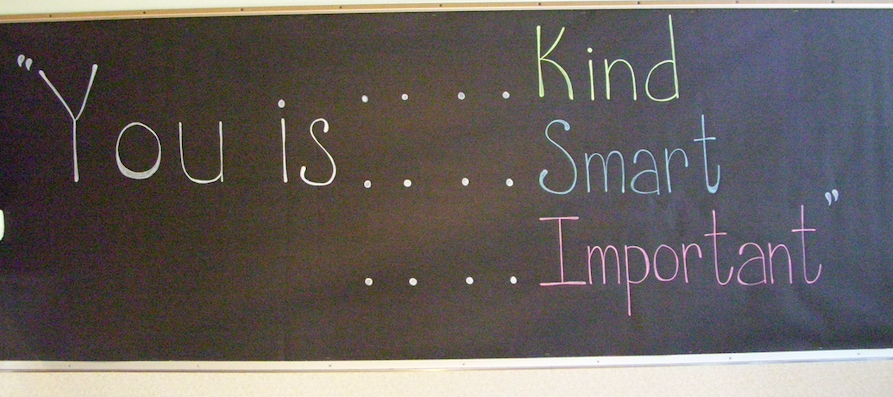Three Ways To Encourage Your Student To Be Kind
Let’s talk about language.
As you will come to find in my book, The Overly Honest Teacher, language was a huge foundation of the curriculum I taught, the classroom I built, and the culture I created as a middle school teacher. The words students spoke to one another mattered. The vocabulary they used to describe themselves mattered. The lyrics of the music they listened to and the dialogue in the films they watched—it all mattered.
Part of this is because I love language. Written, spoken, sung. I love words and their ability to brighten someone’s day or extend a message of support. Words are my jam, and I still, to this day, want my students to love them as much as I do.
One year my classroom theme was built around the novel, The Help. We were reading it in Eighth Grade literature, and I wanted key messages from the book to guide our academic pursuits all year long. The bulletin boards in my classroom housed a profound quote that guides both my professional and personal life:
One of the novel’s protagonists, Aibileen, a domestic worker in 1960 Jackson, Mississippi, speaks this phrase each morning to the child in her care. Wanting this baby to grow up knowing her inherent worth and value, Aibileen reiterates this message over and over, mostly in the hopes of drowning out the array of negativity perpetuated by the child’s mother.
“You is kind.”
“You is smart.”
“You is important.”
The irony of my posting this quote with clearly incorrect grammar was not lost on my students. For the first week of school that year I must have heard from each one of them about its mistakes (I was, and still remain, a stickler about proper noun-verb agreement). But, as fervent as I am about correct sentence structure, I am equally passionate about words that build character and good conscience.
My dear Abileen certainly checks that box.
In my book you will read all about my system of accountability that came into play when students would misspeak about themselves, or others, in our class, so I won’t belabor the point here. But, what I will tell you, is that I never wavered in my expectation that my students were to be kind. Their words were to be vessels for building others up, extending messages of courage and compassion and congratulations. They were to fight off the urge to respond with snark when a classmate was annoying them; refuse to give into the temptation to name-call when someone made a mistake; and they were expected to give one another the grace to extend love to each other even when they were still learning to love themselves..
Being an adolescent is hard. And being a human is even harder.
If we are going to cast off the bad habits and negative routines of life before COVID; if we have any hope of cultivating generosity in following generations, then we have to choose our words wisely, and we have to demand the same of our youth.
Kids today thrive on self-deprecation. They are in a constant state of comparison, being fed conflicting content from all directions. So much of social media challenges my students to hold their self-worth up against a universe of filters and photoshop, and they lack the wisdom that only comes with time to discern which of these influencers is truly there to build them up. Compound that with an audience of followers who use words to cast judgement on their posts and feeds, and you have a climate of superficiality and self-doubt.
As the end of each year approached, my Seventh Grade students would work on a collaborative project. Affectionately titled The Book of Affirmations, every student in my class (of 30-something scholars) was to write three sentences to each of their classmates using adjectives and positive thoughts to express their appreciation of one another. The caveat was that every affirmation had to use a different adjective, so no two were alike (there’s never not an opportunity to have students use the Thesaurus and expand their word count).
Once submitted, I would have them all printed and bound into individual books, and we would head out on a retreat to read them over together. Not only would they find comfort and affirmation in the positive words, but they would likewise have the opportunity to see what others treasured about their classmates. This helped to nurture a deeper appreciation for one another.
Even I was the recipient of kind words once in a while. These were left on my classroom whiteboard at lunchtime or when I first walked in in the morning.
It didn’t matter how wonky the week was, or if I was having a bad hair day, or if my grading of student essays was three weeks behind schedule. When my students gave me this kind of affirmation, I could tackle anything the day, or week, or year, was deciding to throw at me.
Now . . . was our classroom always sunshine and roses? Was it peace, love, and harmony 24/7? If you instill this methodology at home, will it diminish sibling rivalries and manifest chores being done without prompting?
Nope. Not a chance.
But it just might alter how your children view themselves and others. The more we change the internal dialogue for our students, the more we enable them to choose to be kind over catty.
How?
Well, for starters, you have to model this methodology. You need to be attune to the words you speak, the phrases you utter, the judgments you dish out. Kids hate hypocrisy, so it’s essential that if you want them to take your expectations seriously, they need to see you buying in-- hook, line, and sinker.
Then, make a family pact. Come up with a system of accountability, and institute consequences whenever anyone—you, your partner, your other kiddos—violate the agreement to show respect for self and others. Maybe it’s in the form of extra chores or taking a time out from technology (that’ll quickly solve the issue!). Perhaps you record points for observable changes in attitude or response that result in extra privileges on weekends. Motivation is crucial whenever we seek to fix a bad habit, and it usually takes at least 14-days to change well-oiled routines, so expect to be committed to the kindness cause for at least a month before you start to see fruits of your labor.
Start a gratitude journal. Back when I taught, we had a challenge one year—to find as many puns and oxymorons in real life as we could. You know, like jumbo shrimp or a boiled egg is hard to beat. I had a notebook on my podium, and every day at least one student added to it. The frenzy over finding these was palpable, and if a student saw a classmate add to our collection they would run up and read it before the ink had a chance to dry.
Do the same at home with affirmations. Have a notebook in a common space in the house, and start writing down things you appreciate about one another. Maybe you witness a random act of kindness, or a really awesome study session, or generosity in sharing the last of a carton of ice cream. Write it down! Then over dinner or on the bus, take time to read it with each other. I guarantee that even the most disengaged teenager will be into seeing what others appreciate about them, which inevitably will inspire them to pass the same along.
So, no matter how disgruntled we all are in the dumpster fire that is 2020, there is always the space and capacity to be kind. Let’s continue to use every teachable moment possible to be a catalyst for positive change. Let’s come out of this year with perfect vision, the true essence of 20/20, as we seek to recognize in one another how kind, smart, and important we truly are.





